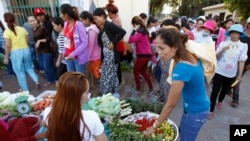Union leaders have sent a request to the Ministry of Labor to make changes in a draft law to regulate unions, which experts say could be used to severely limit the freedom of assembly for workers. Earlier this month, some 200 union members met to discuss how to collectively seek changes in the draft.
An estimated 600,000 people are employed by garment manufacturing, a major economic driver for the country. But wages remain extremely low. The government agreed to raise the minimum wage to $128 a month last year, though workers say it is not enough to keep up with the rising cost of living—leading to unhealthy workers and an ongoing trend of mass faintings on factory floors.
The Ministry of Justice is currently examining the draft law on unions, before it is sent to the Council of Ministers for further review.
Labor leaders complain the law is meant to help factories, not workers, and includes provisions that would stymie basic rights to assembly. For example, the draft states that a local union can only form where it has support of 20 percent of workers; union leaders want that changed to only three workers. The draft also says labor leaders should not have a criminal record; leaders say that should be dropped. And the draft says unions can be dissolved by the courts for carrying out illegal acts; leaders want that provision dropped.
The Ministry of Labor has invited unions to discuss the final draft of the law at the ministry next Tuesday.
Ath Thorn, head of the Coalition of Cambodia Apparel Workers Democratic Unions, said he has heard no response to the unions’ requests to change the draft. A similar request was sent in 2014. The draft law has not been officially made public for comment.
Union leaders will go the meeting next week to discuss the draft, he said. “Protests would be the last thing to do.”
The draft law comes amid a recent crackdown on union activities. Last year, the government put five union leaders under court watch, following violent strikes in 2013 and early 2014.
Pao Sina, president of the Collective Union of Movement Workers, who is among those under court supervision, told VOA Khmer unions remain worried by most parts of the draft law. Nearly 20 unions are ready with about 500 workers to demonstrate in front of the National Assembly later this month to protest the draft. “We meet to show our opposition to the law,” he said.







